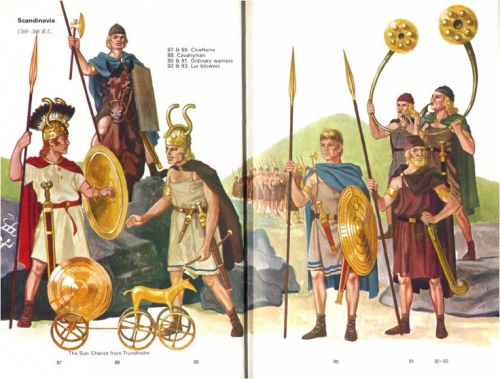A deep and insoluble question that dogs the history of paganism in northern Europe before the advent of Greek and Roman expansion and christianity is that which asks about its structure and theology. Was it generally polytheist – believing in a host of different gods each with individual functions? If so, did it follow a similar system to the southern European religions? …. Or was its focus dualist – having god and goddess figures representing the perceived universal polarities? What if the dualist interpretation is the root of the polytheist, even?
Romans such as Julius Caesar (1stC BC De Bello Gallico) wrote that the ‘barbarian’ Gauls worshipped similar gods to them, but scholars consider such accounts as undetailed and lacking useful context. The fact that some Gauls in the south appear to have become quite Hellenized by the time of Caesar’s wars demonstrates the complicating factors at play. From the accounts we can see there are some apparent differences in theology and organisation between Gaulish/British and Roman official religion: Foremost was the system or college of learned druids at the apex of these societies, and also the reported emphasis on reincarnation, and the ideas about human ‘sacrifice’ that these appeared to engender:
They are said there to learn by heart a great number of verses; accordingly some remain in the course of training twenty years. Nor do they regard it lawful to commit these to writing, though in almost all other matters, in their public and private transactions, they use Greek characters. That practice they seem to me to have adopted for two reasons; because they neither desire their doctrines to be divulged among the mass of the people, nor those who learn, to devote themselves the less to the efforts of memory, relying on writing; since it generally occurs to most men, that, in their dependence on writing, they relax their diligence in learning thoroughly, and their employment of the memory. They wish to inculcate this as one of their leading tenets, that souls do not become extinct, but pass after death from one body to another, and they think that men by this tenet are in a great degree excited to valor, the fear of death being disregarded. They likewise discuss and impart to the youth many things respecting the stars and their motion, respecting the extent of the world and of our earth, respecting the nature of things, respecting the power and the majesty of the immortal gods.
In the same book (De Bello Gallico Book 6 ch.21) Caesar claimed that the German peoples of the 1stC BC:
” … rank in the number of the gods those alone whom they behold, and by whose instrumentality they are obviously benefited, namely, the sun, fire, and the moon; they have not heard of the other deities even by report…”
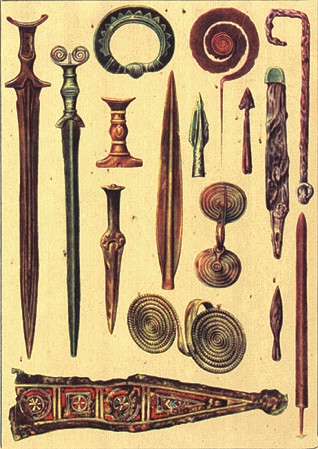 Coupled to his assertion that the Germans had no Druids, Caesar was possibly making a declaration of their apparent primitivism and lack of philosophical gods and ideals. Surely no Roman would stoop to this? Caesar had his eyes on conquest…
Coupled to his assertion that the Germans had no Druids, Caesar was possibly making a declaration of their apparent primitivism and lack of philosophical gods and ideals. Surely no Roman would stoop to this? Caesar had his eyes on conquest…
However Caesar’s life was curtailed by jealous forces, and when his successor Augustus commissioned Vergil to write the Aeneid about Rome’s supposed cultural origins at Troy, Caesar’s comment on reincarnation (seemingly a barbaric tenet) has its waters somewhat muddied by Book 6 which depicts Aeneas’ visit to Hades to his father, Anchises. During this he is instructed how purified souls drink the waters of forgetfulness from the River Lethe before crossing into reincarnation. This crossing is sometimes associated with entering Elysium – a place Homer placed on the banks of the world-encircling river, Okeanos, and which Hesiod referred to as the Blessed Isles, watched over by the Titan god Cronus (Saturn to the Romans). This is not actually that unusual as Pythagoras had a well-documented belief in metempsychosis that – along with the writings of Plato (Timaeus) and with the Greek mystery cults – had a popular following among the intellectual elites of the Roman Empire, Vergil and Ovid being particular examples. Here is that part of the Aenied:
[723] Meanwhile, in a retired vale, Aeneas sees a sequestered grove and rustling forest thickets, and the river Lethe drifting past those peaceful homes. About it hovered peoples and tribes unnumbered; even as when, in the meadows, in cloudless summertime, bees light on many-hued blossoms and stream round lustrous lilies and all the fields murmur with the humming. Aeneas is startled by the sudden sight and, knowing not, asks the cause – what is that river yonder, and who are the men thronging the banks in such a host? Then said father Anchises: “Spirits they are, to whom second bodies are owed by Fate, and at the water of Lethe’s stream they drink the soothing draught and long forgetfulness. These in truth I have long yearned to tell and show you to your face, yea, to count this, my children’s seed, that so you may rejoice with me the more at finding Italy.” “But, father, must we think that any souls pass aloft from here to the world above and return a second time to bodily fetters? What mad longing for life possesses their sorry hearts?” “I will surely tell you, my son, and keep you not in doubt,” Anchises replies and reveals each truth in order.
[724] “First, know that heaven and earth and the watery plains the moon’s bright sphere and Titan’s star, a spirit within sustains; in all the limbs mind moves the mass and mingles with the mighty frame. Thence springs the races of man and beast, the life of winged creatures, and the monsters that ocean bears beneath his marble surface. Fiery is the vigour and divine the source of those seeds of life, so far as harmful bodies clog them not, or earthly limbs and frames born but to die. Hence their fears and desires, their griefs and joys; nor do they discern the heavenly light, penned as they are in the gloom of their dark dungeon. Still more! When life’s last ray has fled, the wretches are not entirely freed from all evil and all the plagues of the body; and it needs must be that many a taint, long ingrained, should in wondrous wise become deeply rooted in their being. Therefore are they schooled with punishments, and pay penance for bygone sins. Some are hung stretched out to the empty winds; from others the stain of guilt is washed away under swirling floods or burned out by fire till length of days, when time’s cycle is complete, has removed the inbred taint and leaves unsoiled the ethereal sense and pure flame of spirit: each of us undergoes his own purgatory. Then we are sent to spacious Elysium, a few of us to possess the blissful fields. All these that you see, when they have rolled time’s wheel through a thousand years, the god summons in vast throng to Lethe’s river, so that, their memories effaced, they may once more revisit the vault above and conceive the desire of return to the body.”
In truth, the Greek and Roman spiritual worldviews were a composite of oral traditions woven into the dialectic transmissive mediums of art, poetry, song and theatre. Although deriding ‘barbarian’ religion, the ‘occult’ practices of the mystery religions of Orphism, Mithraism etc allowed Romans to stay in touch with the primitive fundamentals of paganism. In this manner they mirrored what Caesar had seen among the Atlantic peoples and their druidic religious system. The difference with the Roman system of priests of the ‘Olympian’ gods was that they were often simply members of the patrician and aristocratic classes, acting out pietous civic duties. As such we have little evidence that they formed a primary collegium – it was more often a secondary role. The core and perhaps oldest Roman religious cult was that of the household – of the genius, the gens, the lares and manes – representative of the ancestral cults of traditional European societies. These are some of the ‘peoples’ Aeneas sees in Virgil’s vision of Elysium and Hades.
The peoples who the Greeks and Romans interfaced with and conquered generally took on their ways, and they ways of the conquered were fitted in to their cultures (albeit in a demoted form). As the Mediterranean cultures expanded their influence and merged during the progress of the 1st millennium BC, so the Pantheon became a reality. During the process, the figurative realities of poets and philosophers became increasingly concreted by power, religious celebrity and literature.
Rome’s active policy of the plantation of (not just ethnic Roman) migrants among conquered cultures, coupled to the introduction of vigorous consumerism successfully displaced native traditions and imposed Roman worldviews and practices in a relatively short period of time. The fact that we know so little about the paganism of the Atlantic Europeans is because the process was so successful that there was no need to make a detailed religious assessment as the machine of Empire marched sandle-shod across Europe. The final leverage from paganism to christianity was an easy step after Rome’s political multiculturalism ensured the breakdown and replacement of indigenous religious cultures.
Even before the advent of christianity, much derision was heaped upon this overly-complex, often contradictory mass of deities and interpretative ‘mystery cults’ began to become more common. Jewish theologians struggling to establish their model of post-exilic monotheist orthodoxy and theocratic rule in Judaea had been revolting against the cultural aspects of Seleucid Hellenization. This culminated in the Roman occupation of Judaea and within a hundred years, the cataclysmic fracturing of that nation whose emergent monotheist faith began to subdivide all over again. It would eventually partition into three parts during the subsequent displacement and migration of its peoples across the middle east and Mediterranean basin and beyond in the following 600 years.
The more pro-Hellenic ‘Christian’ faction of Judean monotheism would find itself increasingly leading the intellectual (and political) arguments against paganism as the empire of Rome fractured under the strain of the cultures it had absorbed. Christian polemicists such as Cyprian and Augustine of Hippo were to argue that pagan gods were nothing but deified ancestors and leaders, and that the various spirits, daemones, lares and genii that populated the pagan spiritual world were in fact evil: a simplistic but effective argument that suited an intensely confusing, doubt-ridden and stressful period in European history. This approach to Mediterranean polytheism was to influence the tone of subsequent Christian interpretation of paganism, no matter what its actual true form was.
During and after the establishment of christianity in their country, Irish monks began to compile a similar Christian narrative tradition to deal with their own land’s pagan gods and ancestor-traditions, following the template laid by the ‘Augustinian’ polemical style of the ‘New Empire of Light’. The Irish invented their own highly stylised euhemerist Christian literature to match and exceed these: it would consign paganism to the same fate as on the continent, and paint its divinities into a pseudo-history of failed invaders and tyrannical warlike and venal rulers. In the same manner, christian Scandinavians of the 12th and 13th centuries would produce saga traditions which portrayed their (more recently) former gods in a similar manner: multiple, hierarchical, euhemerised, amoral and modelled largely after the deposed ‘Olympian’ gods of the Mediterranean.
The widespread use of euhemerist interpretation, the control of literacy by Christian elites and the difficulties inherent in expressing aspects of oral traditions using the fixed literary medium means that there is little good historical evidence about what pagan North Europeans believed.
The answer to the difficult question about northern pagan identity and belief lies in a fundamental understanding of what ‘paganism’ actually is and was. The state-sponsored religious cults of the Mediterranean classical age were designed to reflect the temporal power of the civilisations promoting them, and as these temporal powers grew so did their religions, the spiritual system reflecting the temporal one in its hierarchy and complexity after the manner of the older religions of ancient Egypt and the ‘Fertile Crescent’. Christianity simply followed in these footsteps.
In fact, the popular religion of country peoples and tribal groups under the classical empires was quite different to that of those involved in expansionism and regional overlordship. It was much simpler and reflected the necessities of the worldview of those who subsisted with the land, and left fewer relics in art, masonry and literature. To metropolitan elites, these simpler versions of religion were considered barbarism and tended to be derided, or to be absorbed into the popular spectacles of the fast-moving, ever-changing mainstream metropolitan cultures. The adornments and trappings of paganism that survived in the archaeological remains to the current day are generally elite interpretations of this core spiritual root.
The core basis of the Greek mythos (derived largely from Hesiod and Homer) is that there were 3 phases of overlord gods: Ouranos, Cronus then Zeus. Ouranos was the sky, who coupled with the Gaia, the Earth. Her offspring were the Titans who deposed Ouranos, and led by Cronus (who famously castrated his father) ruled over the ‘Golden Age’ (which was something akin to Elysium – showing the conflation of historical time with contemporary ‘place’ in the ancient worldview). Cronus then fathered Zeus who in turn deposed him, and the rest – as they say – is ‘history’ (in other words, where the bard Homer picks up the tale). Similar tales of one order replacing the other are echoed much later in the Scandinavian saga literature of the 12th/13thC, which records some original epic verse and stories of their late pagan era. The similarities are interesting.
The Olympian Gods were the third order, but their inception and promotion of their respective cults is very much linked in history to the growth and expansion of powerful kingdoms and city states during the late Greek Bronze Age. During this age (that of Homer and Hesiod – creators of ‘historic’ epic verse for a new order), the idea of a ‘civilisation’ that was better than that of its ‘barbarian’ origins was born. The second and first order of Greek gods seem to be of the elemental order that existed much further afield than the Mediterranean, and which persisted in the folklore of the Atlantic peoples down to the modern day. Cronos, as Lord of the Golden Age and Elysium/The Blessed Isles becomes functionally identical with the British & Irish Isles’ own god – Manannan. Greek writer Plutarch even stated explicitly that Cronus was worshipped in an actual Island called Ogygia believed to lie west from Britain. To Homer (in the Oddysey), this ?mythical isle was home to Calypso and her father Atlas/Atlantis. Add in the mythology about Leto mother of Apollo, the river Lethe, and Leda and things become distinctly more interesting. These again, are so curiously similar to Irish and Manx legends that they are either the cause or derived from a common mythos…



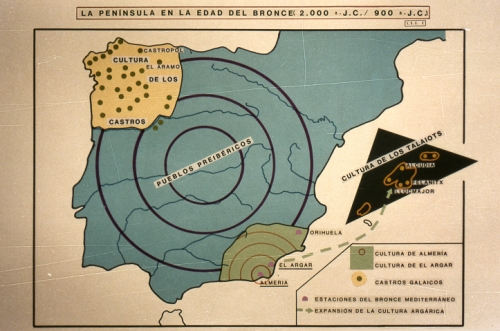
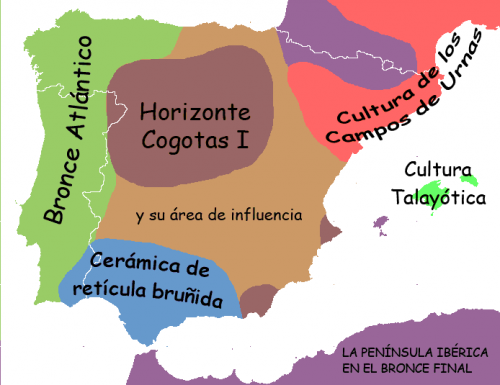
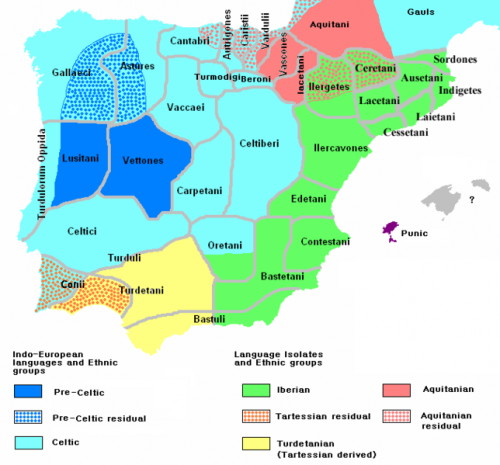

 del.icio.us
del.icio.us
 Digg
Digg